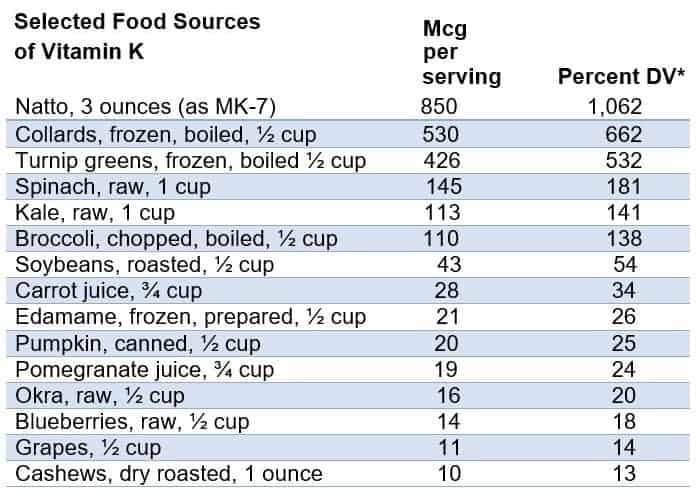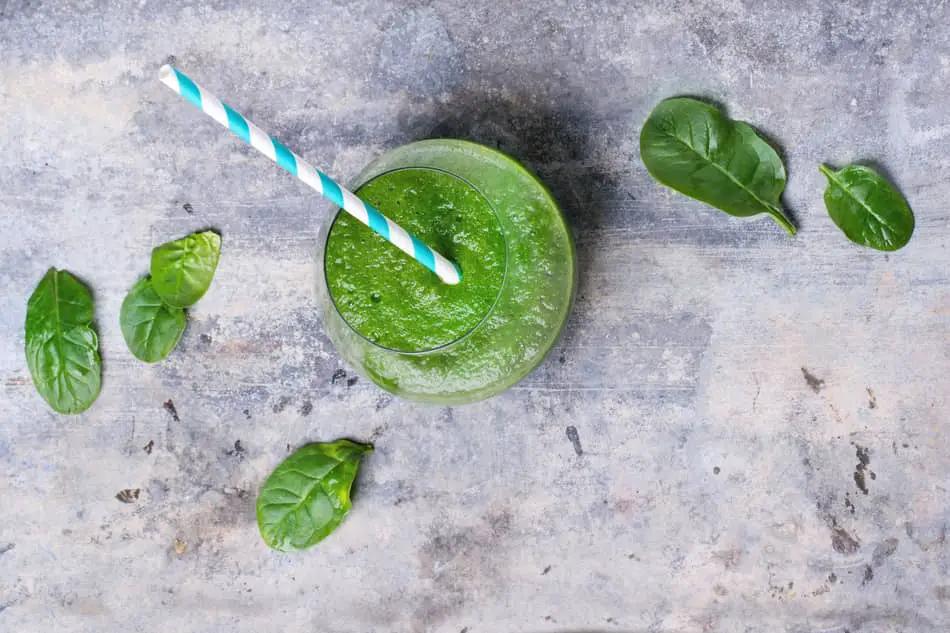In this article I’m going to answer some of the most common questions I get from vegans about vitamin K. Many of the themes overlap, as some of the most frequent inquiries ask more or less the same thing, just in different ways. So you may want to use the table of contents to zip right down to the content that interests you.
Is Vitamin K Vegan?
Yes, vitamin K is vegan. Vitamin K1 (the only form needed from diet) is found abundantly in plant foods—especially dark-green leafy vegetables like kale and spinach. Vitamin K2 is mostly found in animal foods, but this version of the vitamin is not essential as your body can make it from vitamin K1.1
Are Vitamin K Supplements Vegan?
Standard over-the-counter vitamin K1 and vitamin K2 supplements are generally considered vegan. The latter (K2) is made via microbial fermentation.2 However, manufacturing methods do vary and some vitamin K may be unacceptable to strict ethical vegans.
For example, the 2 mg/0.2 m1 ampoule oral Konakion by Roche Pharmaceuticals uses cholic acid (a compound used to make the emulsifier glycocholic acid), which is derived from the gallbladder of cattle.3 There are also water-soluble forms of vitamin K made for folks with fat malabsorptive disorders (Synkayvite, AquaMephyton, and Kappadione). These are considered vegan.
Are Vitamin K Injections Vegan?
Most intramuscular vitamin K injections are vegan-friendly because they bypass the GI tract and thus don’t need to use an emulsifier.3 According to the CDC, these shots are used to treat vitamin K deficiency bleeding (VKDB), which occurs when babies can’t stop bleeding due to lack of Vitamin K-dependent clot formation.4
Is Hydroquinone Vegan?
Hydroquinone (reduced vitamin K) is used in skin lighteners such as SkinLite because it promotes depigmentation. Hydroquinone is vegan, as it’s produced chemically without any animal-derived precursors. But it may not be healthy to take long-term. It’s been linked to cancer and organ-system toxicity.31
It works by both decreasing the production of and increasing the degradation of the melanin pigments in your skin. This, of course, can lead to increased exposure to UVA and UVB rays, leading to premature aging and skin cancer.
Theoretically if one stayed out of the sun it could be okay as far as sun damage. However, it is linked to organ-system toxicity which is enough reason for many to want to avoid this compound.5
Do Vegans Need Vitamin K?
Vitamin K is an essential nutrient for all humans including vegans. The body makes only small amounts—much less than what’s needed—so we have to meet the bulk of our needs for this nutrient via diet. I think this question probably pertains more to supplementation.6
Do Vegans Need to Supplement with Vitamin K?
In general, vegans needn’t supplement with vitamin K to meet requirements for this nutrient. Vitamin K1 (the only form needed via diet) is plentiful in plant foods. Vitamin K2 MK-7 can be found in natto (fermented soy). Vitamin K2 MK-4 is present only in animal products but isn’t essential in the diet.
No one really “needs” to supplement with vitamin K2, but some people choose to because it’s thought to be potentially beneficial in preventing heart disease and degenerative bone disease. In calcium regulation, it helps ensure that less calcium gets deposited into soft-tissue and more gets put into bones, resulting in reduced arterial stiffness and stronger bones.
What’s the Difference between the Various Forms of Vitamin K?
First, let’s establish what they have in common: the various forms of vitamin K (compounds having vitamin K activity) have a 2-methyl 1, 4-naphthoquinone ring with a substitution at the 3 position. Exciting, I know. For this reason, vitamin K exists as a variety of different vitamers.
The naturally occurring vitamers are divided into two categories:
- Vitamin K1 or phylloquinone—this form has a phytyl group at the 3 position of the ring (2-methyl 3-phytyl 1,4-naphthoquinone)
- Vitamin K2 or menaquinone—this form has an unsaturated multiprenyl group at position 3 of the ring.
Then we have the synthetic form, menadione (2-methyl 1,4-naphthoquinone) used in animal feed. In fact, vitamin K was first discovered by H. Dam in the 1920s when it was noticed that chicks on a low-fat/low-vitamin K diet would become hemorrhagic as their blood would take a long time to clot. They named it vitamin K after the Danish word koagulation.
Other differences between the two classes are the sources of food you’ll find them in (plant foods and animal products for K1 and K2, respectively), as well as their functions in the body. K1 is used for a variety of functions (blood clotting as mentioned). K2 plays various roles in bone metabolism, but the specific functions vary with chain length.
Vitamin K2 (MK-4 through -13)
The K2 class has different vitamers abbreviated as MK-x. They go all the way up to -13, but the most well-studied K2 vitamers are MK-4, MK-7, MK-8, and MK-9. MK stands for menaquinones and the number in MK-x is based on the number of isoprenoid groups in the side chain.
So, if someone talks about long-chain vitamin K2 they’re referring to MK-7, -8, and -9. MK-4 (menatetrenone) is a short-chain form of vitamin K2. Vitamin K2 isn’t essential in the diet as some K2 vitamers such as MK-4 are synthesized in the body from phylloquinone (K1).
In animals, menadione (the synthetic version mentioned above) can be converted in tissues to make MK-4. This in part contributes to the presence of K2 in animal products.
How Much Vitamin K Do Vegans Need?
Due to lack of data, the Food and Nutrition Board (FNB) has yet to establish requirements for vitamin K.6 For this reason, recommendations are expressed as Adequate Intake (AI) and are based on the need for coagulation function. 6 The AI for vitamin K is 120 μg and 90 μg per day for adult men and women, respectively. 6 Unlike other vitamins, recommendations don’t go up during pregnancy and lactation.

The above values are derived from food composition databases that provide info primarily on vitamin K1; it’s thought that vitamin K2—both dietary and bacterially-generated—likely contribute somewhat to vitamin K status. However, the extent to which K2 contributes to essential vitamin K activity in humans remains unknown.7-9
Could one benefit from more vitamin K than the above AI? Maybe. Current metabolic studies suggest that while the existing recommendations are adequate for coagulation function, they may be inadequate in providing for optimal bone health.10,11
What Are the Symptoms of Vitamin K Deficiency?
Diminished Blood Clotting Function
Blood clotting factors are proteins that control bleeding. The clotting process requires many different factors working together in a series of reactions to stop bleeding
Impaired Bone Metabolism
Vitamin K is needed by osteocalcin to facilitate (via carboxylation) the binding of calcium ions to the lattice-like extracellular bone matrix (ECM). Osteocalcin is thought to be involved in bone remodeling, and it’s the γ-carboxylation of osteocalcin that’s thought to underly the supposed protective effects of vitamin K in bone.12 For this reason, subclinical vitamin K deficiency is associated with diminished bone mineral density (BMD) and higher rates of fracture.13
Soft Tissue Calcification
Excessive soft tissue (read: artery) calcification is a potential complication of poor vitamin K status.14 Indeed, deficiency of the vitamin has been linked to arterial calcification or CVD, and inflammation.15 Calcification of arteries decreases their stiffness, prevents vasodilation, and contributes to the plaque buildup that can eventually occlude blood flow completely.
Bone dentin and cartilage are comprised in part by MGP (matrix Gla protein). MGP is associated with bone’s ECM protein, where it may promote bone calcification. All else
A lack of MGP has been linked to extensive calcification of arteries, which suggests a protective function against soft tissue calcification. Like with osteocalcin, the exact roles in which it may accomplish this function is uncertain.
Are Vegans Commonly Deficient in Vitamin K?
Vegans are not characteristically deficient in vitamin K. According to NIH, those at risk for vitamin K deficiency include non-vitamin K-treated newborns and people with malabsorptive disorders.16
If anything, vegan intakes of vitamin K may be a bit higher compared to omnivores. For example, in the EPIC-Oxford study, folks following a vegan diet were shown to have higher intakes of magnesium, folate, and vitamins E, C, and K compared to other groups.17 In healthy adults, vitamin K deficiency is unlikely regardless of
Population groups most at risk for vitamin K deficiency include:13,6
- People with fat malabsorptive disorders—e.g. obstructive jaundice, cystic fibrosis, Crohn’s disease, chronic pancreatitis, intestinal bypass surgery, and liver disease. Vitamin K is a fat-soluble vitamin and requires fat to be absorbed by the intestines.
- Newborn infants—due to their lack of vitamin K-producing gut bacteria coupled with the low vitamin K content of breast milk among other reasons.
- The elderly—this seems to be a problem unique to the US where vitamin K intakes are often shy of 80 μg daily.
- Those with vitamin K-poor diets who are also undergoing chronic antibiotic therapy—treatment with sulfonamides and broad-spectrum antibiotics. These drugs kill off GI bacteria that synthesize vitamin K.
What Vegan Foods Contain Vitamin K?
The best vegan sources of vitamin K include:6
- Leafy green vegetables. For example, spinach, turnip greens, collard greens, and some salad greens. Kale provides about 547 mcg per 1 cup which comes to 684% DV.26
- Broccoli. Provide 92.5 mcg or 116% DV.27
- Basil (dried). A mere tsp. provides 8.6 mcg or 11% DV.28
- Brussels Sprouts. 1 Cup provides 300 mcg or 375% DV.29
- Cabbage. 1 Cup has 31.8 mcg or 40% DV.30
You can find smaller amounts of phylloquinone in cereals and fruits.
As you can see, one or two servings of some of the more vitamin K-dense foods well surpasses the DV. In fact, most vitamin K in the standard omnivore diet is provided by phylloquinone (K1) from plant foods. It’s thought that the average adult may consume up to several hundred mcgs of phylloquinone daily.6,18
Select Vitamin K Sources

Do Vegans Get Too Much Vitamin K?
Vegans do not get too much vitamin K and are not at risk for vitamin K toxicity. In fact, no Tolerable Upper Limit (TUL) has been established for this vitamin. The ingestion of large amounts of both vitamin K1 and vitamin K2 hasn’t been shown to induce toxicity.6
The only form of vitamin K known to be toxic is the synthetic form menadione, used in cattle feed, which causes liver damage and hemolytic anemia if ingested in large amounts.
Vitamin K2 for Raw Vegans
Natto, the primary food source of vitamin K2 for plant-based dieters, is not raw vegan-friendly because the soybeans are steamed prior to fermentation. However, vitamin K2 supplements are produced microbially and are thus suitable for raw vegans.
Do Vegans Need Vitamin K for Bone Health?
Vegans need to ensure adequate intakes of vitamin K for bone health. However, unlike other nutrients needed for healthy bones, those following plant-based diets tend to get ample amounts of vitamin K. Vitamin D and calcium intakes can be quite troublesome for vegans and thus require more attention.
While we’re on the subject, there are two vitamin K–dependent proteins that’ve been identified in bone and cartilage:
- Osteocalcin aka bone Gla protein—which makes up about 10-20% of noncollagenous protein in bone.
- Matrix Gla protein (GMP)—the synthesis of which is stimulated by retinoic acid and calcitriol.
Osteocalcin is secreted by bone cells during extracellular matrix (ECM) formation. Vitamin K-dependent carboxylation of osteocalcin’s Gla residues facilitates the binding of calcium ions to the ECM.
As mentioned elsewhere in the article, osteocalcin seems to be involved in the bone remodeling process which is thought to account for the protective role of vitamin K in bone health.12 MGP is found in dentin, bone, and cartilage. Like osteocalcin, it’s also associated with bone’s ECM protein, where it’s thought to promote bone calcification.
Vegetarian Diets, Vitamin K Status, and Bone Health
There are ways in which vegetarian diets are thought to be potentially detrimental to bone health. For example,
However, there are ways in which vegetarian diets are thought to potentially benefit bone health. For one, unlike diets containing high amounts of animal protein, vegetarian diets (and vegan diets having 100% plant protein) generate metabolizable anions like bicarbonate and acetate which help reduce calcium excretion.19,20
Additionally, vegetarians tend to consume more leafy green vegetables compared to the general population. As we’ve seen, green leafies like cabbage, kale, and lettuce provide copious amounts of vitamin K essential for bone metabolism.
Low vitamin K intakes are associated with higher risks of hip fracture. In fact, one study found the consumption of one or more servings per day of lettuce to be associated with a 45% reduction in hip fracture risk.21
That’s just one study. The truth is that the literature contains numerous associations between vitamin K levels, BMD and fracture risk. But, currently, evidence showing a protective effect of dietary vitamin K intake on bone health remains ambiguous.12,10,22-25
There are many factors that may potentially account for the conflicting results, most being related to differences in the study populations (age, gender, etc.), study time frames, the bones studied, the forms and dosages of vitamin K used, and the presence of other nutrients.
What Are the Best Practices to Avoid Nutrient Loss and Deficiency?
Vitamin K can be damaged by exposure to light and heat. However, cooking of plant foods such as kale softens the food matrix allowing the vitamin to be released from the plant structure increasing its rate of absorption. So, on balance cooking green leafies tends to be a good thing for nutrient availability.
One way to avoid the nutrient loss that’s often caused by cooking is to use a high-speed blender which blasts the plant down to a subcellular level allowing for near full nutrient extraction and increased absorption. I.e. you increase the availability of the nutrients without causing nutrient loss via heat damage.
References
- Gropper, Sareen S.; Smith, Jack L.. Advanced Nutrition and Human Metabolism (Page 409).
- Jose L. Revuelta, Ruben M. Buey, Rodrigo Ledesma‐Amaro, and Erick J. Microbial biotechnology for the synthesis of (pro)vitamins, biopigments
and antioxidants: challenges and opportunities. Microb Biotechnol. 2016 Sep; 9(5): 564–567. - Vitamin K For Newborns https://www.midwifery.org.uk/articles/vitamin-k-for-newborns/
- Vitamin K Shot – Essential in Preventing Serious Bleeding in Newborns | Gateway To Health Communication | Cdc https://www.cdc.gov/healthcommunication/toolstemplates/entertainmented/tips/KVitamin.html
- Hung CF, et al. The risk of hydroquinone and sunscreen over-absorption via
photo damaged skin is not greater in senescent skin as compared to young skin: nude mouse as an animal model. Int J Pharm. 2014;25:135–45. - Food and Nutrition Board, Institute of Medicine. Dietary Reference Intakes. Washington, DC: National Academy Press. 2001 pp. 162–96.
- Booth SL. Vitamin K: food composition and dietary intakes. Food Nutr Res 2012;56.
- Conly JM, Stein K, Worobetz L, Rutledge-Harding S. The contribution of vitamin K2 (menaquinones) produced by the intestinal microflora to human nutritional requirements for vitamin K. Am J Gastroenterol 1994;89:915-23.
- Suttie JW. Vitamin K. In: Ross AC, Caballero B, Cousins RJ, Tucker KL, Ziegler TR, eds. Modern Nutrition in Health and Disease. 11th ed. Baltimore, MD: Lippincott Williams & Wilkins; 2014:305-16.
- Cashman KD, O’Connor E. Does high vitamin K1 intake protect against bone loss in later life? Nutr Rev. 2008; 66:532–38.
- Adams J, Pepping J. Vitamin K
and bone health. Am J Heath-Syst Pharm. 2005; 62:1574–81. - Shea MK, Booth SL. Uptake on the role of vitamin K in skeletal health. Nutr Rev. 2008; 66:549–57.
- Gropper, Sareen S.; Smith, Jack L.. Advanced Nutrition and Human Metabolism (Page 414).
- Elke Theuwissen, Egbert Smit, and Cees Vermeer. The Role of Vitamin K in Soft-Tissue Calcification. Adv Nutr. 2012 Mar; 3(2): 166–173.
- McCann JC, Ames BN. Vitamin K, an example of triage theory: is micronutrient inadequacy linked to diseases of aging? Am J Clin Nutr. 2009; 90:889–907.
- Office Of Dietary Supplements – Vitamin K https://ods.od.nih.gov/factsheets/VitaminK-HealthProfessional/
- Davey, G.K., Spencer, E.A., Appleby, P.N., Allen, N.E., Knox, K.H., Key, T.J., 2003. EPIC-Oxford: lifestyle characteristics and nutrient intakes in a cohort of 33 883 meat-eaters and 31 546
non meat-eaters - Booth S, Golly I, Sacheck J, et al. Effect of vitamin E supplementation on vitamin K status in adults with normal coagulation status. Am J Clin Nutr. 2004; 80:143–48.
- Berkelhammer, C.H., Wood, R.J., and Sitrin, M.D. Acetate and hypercalciuria during total parenteral nutrition. Am. J. Clin. Nutr., 48, 1482, 1988.
- Sebastian, A., Harris, S.T., Ottaway, J.H., Todd, K.M., and Morris, R.C., Jr. Improved mineral balance and skeletal metabolism in postmenopausal women treated with potassium bicarbonate [see comments]. N. Engl. J. Med., 330, 1776, 1994.
- Feskanich, D., Weber, P., Willett, W.C., Rockett, H., Booth, S.L., and Colditz, G.A. Vitamin K intake and hip fractures in women: a prospective study. Am. J. Clin. Nutr., 69, 74, 1999.
- Bolton-Smith C, McMurdo ME, Paterson CR, et al. Two-year randomized clinical trial of vitamin K1 (phylloquinone) and vitamin D3 plus calcium on the bone health of older women. J Bone Mineral Res. 2007; 22:509–19.
- Booth SL, Dallal G, Shea MK, et al. Effect of vitamin K supplementation on bone loss in elderly men and women. J Clin Endocrinol Metab. 2008; 93:1217–23.
- Braam LA, Knapen MH, Geusens P, et al. Vitamin K1 supplementation retards bone loss in postmenopausal women between 50 and 60 years of age. Calcif Tissue Int. 2003; 73:21–26.
- Rejnmark L, Vestergaard P, Charles P. No effect of vitamin K1 intake on bone mineral density and fracture risk in perimenopausal women. Osteoporosis Int. 2006; 17:1122–32.
- Kale, Raw Nutrition Facts & Calories https://nutritiondata.self.com/facts/vegetables-and-vegetable-products/2461/2
- Broccoli, Raw Nutrition Facts & Calories https://nutritiondata.self.com/facts/vegetables-and-vegetable-products/2356/2
- Spices, Basil, Dried Nutrition Facts & Calories https://nutritiondata.self.com/facts/spices-and-herbs/173/2
- Brussels Sprouts, Frozen, Cooked, Boiled, Drained, Without Salt Nutrition Facts & Calories https://nutritiondata.self.com/facts/vegetables-and-vegetable-products/2365/2
- Cabbage, Chinese (Pak-Choi), Raw Nutrition Facts & Calories https://nutritiondata.self.com/facts/vegetables-and-vegetable-products/2377/2
- Avani Ahuja, Neha Singh, Prashant Gupta, Shivangi Mishra, and Vibha Rani. Textbook Of Aging Skin (Page 574). Springer – 2017


